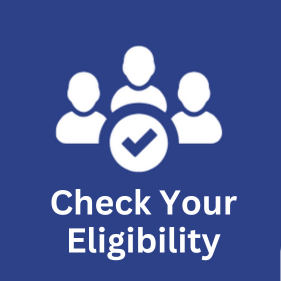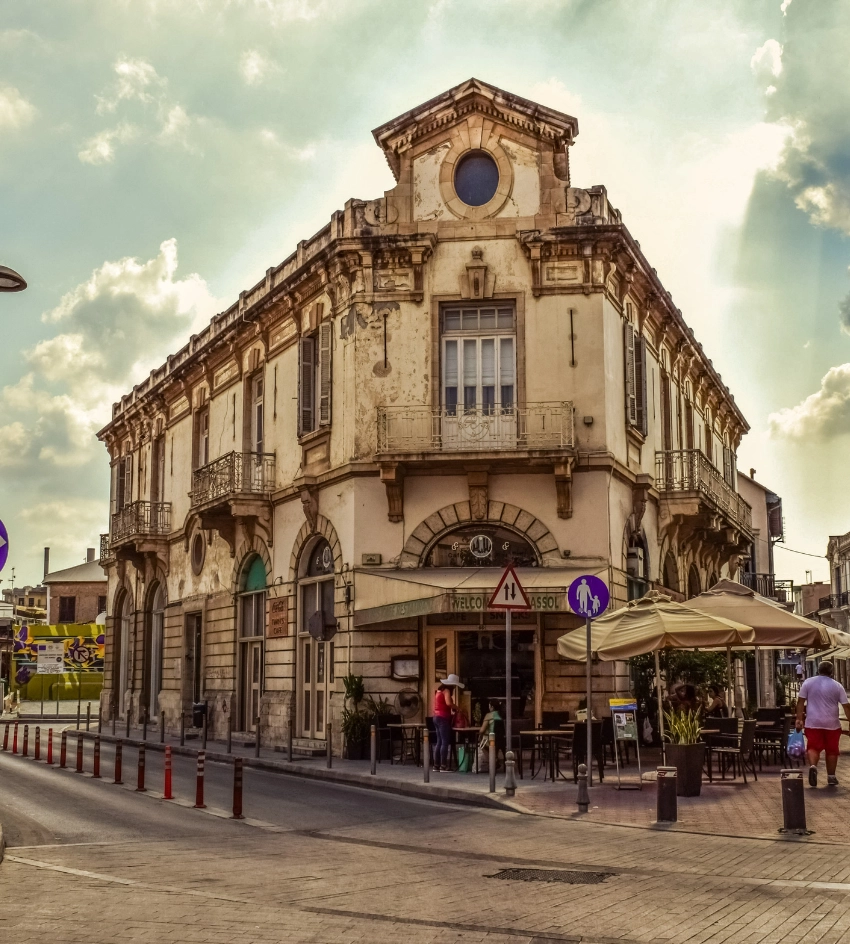SCHENGEN VISA INFORMATION– EU VISIT VISA
What does Schengen stand for?
Schengen is the name of a small village in Luxembourg, on the border with Germany and France, where the Schengen Agreement and the Schengen Convention were signed in 1985 and in 1990 respectively.

WHAT ARE THOSE SCHENGEN COUNTRIES?
- Austria
- Belgium
- Croatia
- Czech Republic
- Denmark
- Estonia
- Finland
- France
- Germany
- Greece
- Hungary
- Iceland
- Italy
- Latvia
- Liechtenstein
- Lithuania
- Luxembourg
- Malta
- Netherlands
- Norway
- Poland
- Portugal
- Slovakia
- Slovenia
- Spain
- Sweden
- Switzerland
WHAT IS A SCHENGEN VISA?
A Schengen visa is a short-stay visa that allows a person to travel to any member of the Schengen Area, per stay up to 90 days for tourism or business purposes.
The Schengen visa is the most common visa for Europe. It enables its holder to enter, freely travel within, and leave the Schengen zone from any of the Schengen member countries. There are no border controls within the Schengen Zone.
However, if you are planning to study, work, or live in one of the Schengen countries for more than 90 days, then you must apply for a national visa of that European country and not a Schengen Visa.
INTERESTED TO STUDY?
LET'S TALK TO OUR EXPERT COUNSELLORS
WHAT IS SCHENGEN AREA?
Schengen refers to the EU passport-free zone that covers most European countries. It’s the largest free travel area in the world. The Schengen Area is an area comprising 27 European countries that have officially abolished many passports and many other types of border control at their mutual borders.
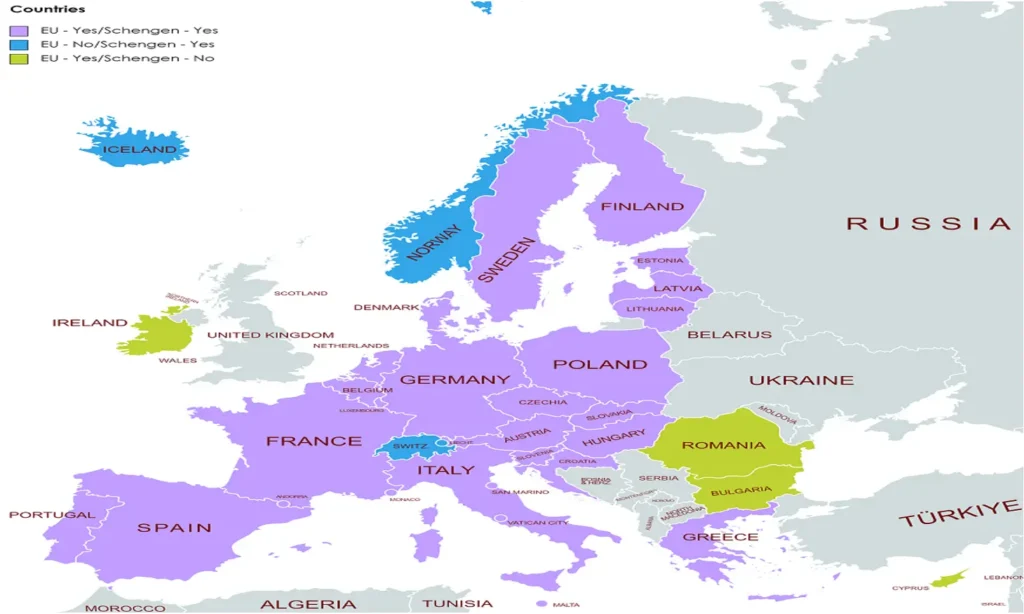
HOW CAN WE HELP YOU?
If you are not sure if you need a visa to travel to Europe or have queries about the type of visa you will need, our advisers are happy to help.One of our expert counsellors will advise you on whether you need to apply for a Schengen Visa and if so can support you throughout the visa application process. This includes assisting you with your visa application form and supporting documents.
If you need to transit to the Schengen Area, we can advise you on the best Transit Visa to apply for based on your circumstances.We have appointments available at our offices across the country. If you are not currently in the city, our counsellors can also arrange remote appointments.For Schengen Visa application help, call us or use our online contact form.
We have a dedicated EU/Schengen Visa Team, which provides skilled help, advice and support throughout the often-complex application process for these visas.
OUR SCHENGEN VISA SERVICE INCLUDES:
- Individual attention to your unique situation, from a consultant whose extensive knowledge and experience of this complex area will prevent common mistakes and save you time.
- Detailed help in creating a perfect application package, including advice on acceptable alternative evidence, if appropriate.
- Submitting the applicationon your behalf (if you are not required to attend in person).
- Providing a Staff member to accompany, support and help youat the visa centre/embassy if you do need to submit in person.
- Tracking the submitted application, and possibly collecting your visa/passport as soon as it’s ready.
- Notifying you in advanceas to when your visa/passport will be available for collection from our office.
- Complete the application formon your behalf.
- Arrange express appointments for many countries.
- Arrange speedy delivery of your visa/passportby any staff member or by any other courier of your choice.
Should you decide to proceed with us, we will take you through a clear and straightforward series of steps.
At Alex Global Consultancy, we ensure that the documents submitted are up to date & flawless. To avoid any future hassles or last-minute issues, clients can rely on our expert guidance and avail Visa Assistance from us as we keep them updated with current changes in terms of documentation, Visa fees and any other additional documents required as declared by the Consulate.
Be confident because we will be with you in every step until you get back to your home.
Feel Free to contact us regarding any question, our expert team will be happy to help you. Call Now.
SCHENGEN VISA APPLICATION REQUIREMENTS:
General Schengen Documents | · Printed Filled up Application Form · Paid Visa Fee proof · Printed Embassy Appointment Letter (if appointments required) · Cover Letter Briefly (1 – 2 pages with travel plans, target countries to travel with reasons, personal profile, profession, financial affordability, previous travel history with purpose and time, family members’ profile, assets and other strong ties to home country) |
Identity Documents | · Valid Passport · 02 PP size Photos EU Standard · NID, Birth Certificate · Police Clearance (if applicable) · Character Certificate from Chairman / Councillors |
Proof of Profession | · If Employed, Job Details: NOC / Leave Letter, Employment Confirmation Letter, Staff ID, Business Card, Payslips, Appointment Letter, · If Business / Self-employed; Business Details: business license, last 3 yrs TIN – Tax Return Documents, 03-06 months Company Bank Statement, Other relevant documents/proofs · If Student, Details: Proof of enrolment, Holiday Letter / No objection letter from, Student ID, Academic Progression, Other relevant documents/proofs · If Retired: Pension statement of the last 6 months and Other relevant documents/proofs · If Unemployed and Sponsored by family member, Relationships Proofs: Marriage Certificate, Family Relationship Proof, Photos, Other relevant documents/proofs. |
Financial Proof | · Sponsorship Letter (with other supports – financial supports. accommodations, travels etc) – by another person that confirms they will be financially supporting your trip to the Schengen. In order for this letter to be valid, it must be accompanied by a bank statement of the sponsor, current passport copy (resident permit), no older than three months. · 03 -06 months Bank Statements with sufficient funds (if possible to show earnings coming in) · Personal Savings, FDR, Notarised Asset Values by documents and family savings / assets · Different EU countries have different financial affordability requirements. Normally it is better to show at least 150 Euros or more for each day in bank statements. |
Accommodations Confirmations | · Accommodation details (hotel reservations or Invitation Letter) · Otherwise, Sponsorship Letter written by a sponsor who will financially support the applicant during their stay. |
Relationship Proof or Proof of Purpose | · If it is being Sponsored, provide Proof of Relationships like Marriage Certificate, Birth Certificate, Other relationship Proof etc. · Otherwise, provide proof of purpose (travel itineraries) |
Travel Medical Insurances | · Travel Medical Insurance (Your Travel Medical Insurance should be valid for your whole stay in the Schengen Area, with a minimum coverage of 30,000 EUR for medical emergencies.) |
Travel Plans & Confirmed Itineraries | · Invitation Letter with reasons / proof of purpose · Air Ticket with Returns / Roundtrip · Train & Bus or other travelling bookings · Various Excursion Activities Bookings |
If any, Previous Travel History | · Old Visa Copies with dates, purpose and destinations · Few Photos from various locations wherever travelled previously |
Proof of Links to Back home / Strong ties or Connections | · Family Relationship Certificate / In-heritage Certificate from Ward Councillors/ Chairman · Family member intro & professional proofs to show family ties · Membership/ Involvements with various organisations / Charity / Commitments to Home Country · Assets Documents, Investments · Affidavits of All Assets & Personal Statement / Statement of Purpose (SoP) · All documents should be in English (translated) and notarised |
Schengen Visa Fee in EUR | · 80 Euros for Adult Applicant · 40 Euros for Children between 6 and 12 years old · Free for Children under 6 years old |
FREQUENTLY ASKED QUESTIONS (FAQ)
How long is Schengen visa valid?
Although multiple-entry visas are valid for longer periods – six months to five years – you may only spend 90 days (duration of stay on your visa sticker) in the Schengen Area within a rolling 180-day period (known as its validity period). The validity period of your visa indicates how long you can use your visa.
What Does a Schengen Visa Look Like?
If the authorities decide to grant you a Schengen visa, they will attach it in the form of a sticker to the blank pages of your passport. This is what a Schengen visa looks like:
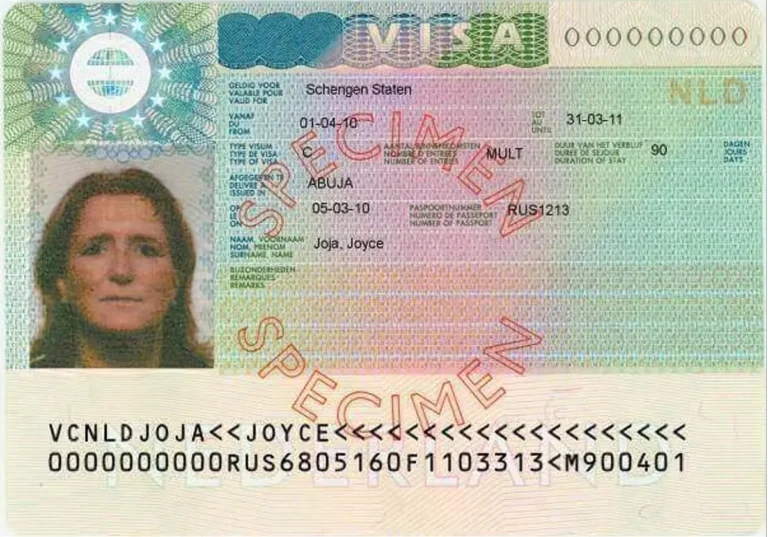
WHAT IF YOU NEED TO STAY FOR MORE THAN 90 DAYS?
If you wish to stay longer than 90 days in the Schengen Area, you will generally need to apply for a long-stay visa or a residence permit from the specific Schengen country where you intend to stay. The European National Visas are granted to individuals coming to one of the Schengen member countries for stays longer than 90 days, like working or studying.
In order to be eligible to apply for the D visas for Europe, you should be in one of the following categories:
- An international student in a program that grants Schengen visas.
- International student about to start full-time studies in Europe.
- Teacher at a higher education institution or research centre in Europe.
- Professional traveling to Europe with the purpose of sharing expertise.
- Traveller in the Schengen Area who is experiencing an emergency, as a medical condition that prevents departure at the end of your National Visa.
WHAT ARE THOSE SCHENGEN VISA TYPES FOR SHORT-TERM VISITS IN EUROPE ?
You need to apply for a Schengen Visa if you intend to visit one or more European countries of this area for the following reasons:
- Business Purposes
- Visiting Friends and Family
- Tourism and Holidays
- Cultural and Sports Events
- Airport Transit and Transit for Seafarers
- Official Visit
- Medical Reasons
- Short-term Study and Research Purposes
Depending on your reasons for visiting the Schengen countries and the frequency of your visits, the Schengen consulate can issue you a single-entry visa, double-entry visa, or multiple-entry visa.
The validity of your single-entry visa depends on the number of days you stated you are going to be in the Schengen zone on your visa application form and the actual decision of the consulate that issues you the Schengen visa.

HOW TO APPLY FOR A VISA TO ENTER EUROPE?
To apply for a Schengen Visa to travel to Europe, you first need to figure out whether you need one or not, depending on the purpose of your travel and nationality. If you do, then you have to put together your travel plan, how many days you plan to be in the zone, the countries you are going to visit (if more than one), the country where you are going to enter, and the country where you’re going to exit.
Once you have that figured out, then you need to review all the Europe visa application requirements you need to fulfil and start the process of setting up a visa appointment at one of the Schengen consulates in your country.
DOES EVERYBODY NEED TRAVEL INSURANCE?
Anyone travelling temporarily to a Schengen area from a country that is subject to visa requirements, be it an individual visitor or group visitors, tourists, or business travellers has to be insured for the time being in the Schengen area.
SCHENGEN VISA REQUIREMENTS ACCORDING TO APPLICANT’S EMPLOYMENT / PROFESSIONAL STATUS:
Specific required documents, based on the visa applicant’s employment status, are as follows:
For Employees:
- Employment contract.
- Current bank statement of the latest 6 months.
- Leave permission from the employer.
- Income Tax Return (ITR) form or Certificate of Income Tax deducted at the source of salary.
- Other employment documents / proof
For the Self-employed:
- A copy of your business license.
- Company bank statement of the latest 6 months.
- Income Tax Return (ITR).
- Other relevant documents / proof
For Students:
- Proof of enrolment.
- Holiday Letter or No Objection Letter from the School or University.
For Retirees:
- Pension statement of the latest 6 months.
If Unemployed and Married to an EU Citizen:
- Confirmation of Employment letter, no older than three months, from their spouse’s employer, stating the position held within the company as well as the starting date.
- Spouse’s valid passport.
- An official marriage certificates.

WHEN IS THE BEST TIME TO APPLY FOR A SCHENGEN VISA?
There are some conditions on when it is the earliest and the latest you can apply for a Schengen visa, as well as when is the most suitable time to apply. According to the Schengen visa application rules, the earliest you can apply for a visa is three months prior to your intended trip. Whereas the latest you can apply is two weeks prior to your trip to Schengen.
The most suitable time is three weeks before you head to the Schengen Area. However, you are highly recommended to apply as soon as you can in order to avoid any possible delays.
Holders of multiple-entry visas may apply six months before the expiry date of the valid visa.
HOW LONG DOES IT TAKE TO GET A SCHENGEN VISA?
Every application is different from each other in considering individual circumstances. Usually, the processing time for a Schengen visa takes about 15 calendar days from the date you submit the visa application. However, the processing time can take longer if additional documents are required.
WHERE TO SUBMIT MY SCHENGEN VISA APPLICATION?
Even though the Schengen zone has abolished internal borders and a visa to one of its member states gives its holder the right to travel through the whole area, you cannot file your application at whichever of its embassies is in the country. There are rules and criteria as to where you should submit your application.
If You Are Visiting Only One Schengen Country:If you are planning to visit only one Schengen country, then you should simply make an appointment at the convenient embassy/consulate/visa centre of that country and attend the interview in there.
If You Are Visiting More Than One Schengen Country: However, it is a bit more complicated in case you will be visiting two or more countries. Depending on the number of days you will be spending in each, you need to apply as follows:
- If you will be spending an equal number of days in each country, you should apply at the embassy/consulate/visa centre of the country, where you will step first.
- If you will be spending an unequal number of days in each country, you should apply at the embassy/consulate/visa centre of the country where you will be spending more days.
Depending on the country, which needs to process your file, you may have to submit your application at:
- The embassy or consulate of the country that you want to visit.
- A Nominated Visa Centreof the country
- The Embassy/Consulate/ Visa centre of another country in your country that has jurisdiction over processing visa Schengen visas.For instance, Iceland has outsourced visa processing to other Schengen countries’ embassies. If you are applying for an Iceland visa, you should apply at their nominated embassy of another country.
STEP BY STEP PROCESS FOR APPLYING A SCHENGEN?
Applying for a Schengen visa in the is similar to applying anywhere else in the world. The application process for a Schengen visa includes the following steps:
- Choose what type of Schengen visa you need
- Locate the nearest diplomatic missions (embassy or consulate)
- Book an appointment
- Complete the Schengen visa application form
- Collect the required documents
- Submit the application
- Pay the application fee
- Attend the interview
- Wait to receive your Schengen visa
Choose What Type of Schengen Visa You Need:Choose the type of Schengen visa that corresponds to your purpose of visit to the Schengen Member State. For example, if the sole purpose of visiting Europe is tourism, then you need to apply for a Schengen Tourist visa, but if you are traveling to Europe to transit from one country to another, you need to apply for a Schengen Transit visa, etc.
Locate the Nearest Diplomatic Missions (Embassy or Consulate):Identify the Schengen country you plan to visit and find out which embassy or consulate is responsible for visa applications from residents of your state.
Book an Appointment:Book an appointment with the diplomatic mission, where you will submit your Schengen visa application. On the day of the appointment, you will have your biometrics (fingerprints and digital photo) taken, so make sure you arrive at the appointment on time.
If, for any reason, you are unable to attend the appointment, you cannot send another person on your behalf but must schedule another appointment.Please note Children /Minor applicants must be accompanied by their parents or legal guardian.
Complete the Schengen Visa Application Form:When applying for a Schengen visa, each applicant must fill out the application form specific to the type of Schengen visa they are applying for. The application form contains questions about you, your trip, and the purpose of your visit. You need to provide true and accurate information, as any false statements will get your visa denied.
Collect the Required Documents:Check the document checklist above to see what documents you need to bring when submitting your Schengen visa application. Make sure you follow the instructions set by the embassy, translate and legalize your documents.
Pay the Application Fee:You must pay the Schengen visa application fee and keep the receipt as proof of payment. The fees may change depending on currency fluctuations and can be paid in local currency only.
Adult | €80 |
Children between 6-12 years of age | €40 |
Children younger than 6 years of age | Free |
In the case of visa rejection, you will not get refunded. Therefore, you want to make sure that the information that you have submitted for this visa is correct and that you have collected all the required documents.
Submit the Application:Submit the Schengen visa application form together with the documents from the checklist to the embassy or consulate of the Schengen Member State you want to visit.
Attend the Interview:All applicants must appear for the interview. This is the part where the consular officer will decide whether to grant you the Schengen visa.
Wait to Receive Your Schengen Visa:You will receive a notification in your email informing you whether your Schengen visa has been approved or not. If your visa has been approved, you can visit the embassy to collect your visa and passport.

WHAT ARE THE REQUIREMENTS FOR A SCHENGEN VISA?
The required documents to apply for a Schengen Visa are listed below:
- Schengen Visa Application Form
- Passport
- Photograph
- Schengen Travel Insurance
- If any, Biometric Data
- Copies of Previous Visas
- Flight Itinerary / Travel Plans
- Cover Letter
- Proof of Financial Means
- Proof of Accommodations
- Proof of Paid Fee
WHAT INFORMATION REQUIRED FOR SCHENGEN VISA APPLICATION FORM?
Applicants must submit a fully completed and signed Schengen Visa Application Form to the competent authorities of the Member State they are applying for a visa no more than three months before their intended visit. The visa application form contains 37 questions that each applicant must fill out correctly and sincerely, with no false statements.
The form is available in different languages; however, the consulate will inform you which language you can use to fill out the application form. If the visa applicant is a minor (younger than 18), the application form must be signed by the parents or legal guardian of the child.
The Schengen Visa application form is divided into four sections that require the following information:
Personal Information Questions:
- Full name
- Date and place of birth
- Nationality
- Sex
- Civil status
- Address
- Phone number, etc
Travel Information:
- Travel document type
- Travel document number
- Issue date and expiration date of the travel document
- reason for travel
- First entry
- Length of stay
- Biometric information, etc
Invitation Information:
- Full name of the person inviting you. (if applicable)
- Host organization information
- Financial support
- Familiar relationship
Date and Signature:
- Date and location of completing the application form
- Signature
You can receive the Schengen Visa application form at the diplomatic missions of the Member State you want to visit or download it from the official websites of the Member State’s embassy (if the embassy has a website).
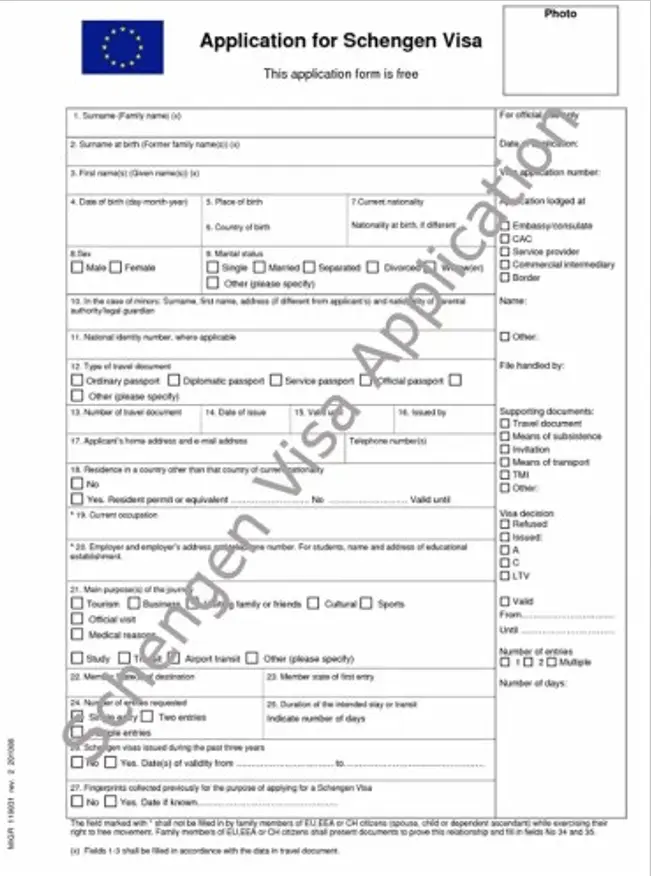
WHAT TO INCLUDE IN THE COVER LETTER?
A cover letter must be addressed to the Embassy or Consulate of the Member State you are applying for a visa. The cover letter is a way of introducing yourself to the visa officials of the country you want to visit and stating the reasons for your travel. A well-written cover letter must be short and clear, not longer than two pages, and can help you in obtaining your visa.
A Schengen Visa cover letter must include:
- The reason for your travel to the Member State.
- The date you enter and when you plan to exit the Schengen area.
- The place you will accommodate.
- What you will do during your visit to the Member State.
- What other countries you will visit (if you plan on visiting other Schengen countries).
- Your employment status.
- Explain why you were unable to submit the documents (if there are any of the required documents missing).
WHAT ARE THE PROOFS OF FINANCIAL MEANS?
When applying for a Schengen Visa you will need to provide proof that you have sufficient financial means to support yourself and cover your expenses during your stay in Europe. You can prove your financial sufficiency in one of the following ways:
- A bank statement of your financial movements for the last three months
- Credit card
- Proof of employment
The minimum amount required is different in each country, therefore you will have to consult with the relevant consular authority in your country.
WHAT ARE THE PROOFS OF ACCOMMODATION?
The embassy or consulate you apply for a Schengen Visa will require you to submit proof of accommodation. This means that you have to provide evidence that you have a place to stay during your visit to the Member State.Depending on where you will be staying, you can provide as proof of accommodation the following:
- Hotel reservation
- Confirmation by an organized tour operator or holiday tours
- Rental agreement/contract
- Invitation letter from the host
Each Member State of Schengen has its own rules when it comes to the host invitation letter. This means that the host inviting you to visit the Member State they are at must provide a specific letter of invitation. For example:
- France:an original copy of the “Declaration d’Accueil” (guarantee document). The same applies if the host is from Luxembourg.
- Austria: a request of “ElektronischeVerpflichtungserklärung“ at the host’s municipality in Austria not earlier than 30 days before your visa appointment date.
- Belgium:an original “Engagement de Prise en Charge – Verbintenis tot Tenlasteneming 3 bis”, stamped by the municipality and embossed stamp by the foreign office.
- The Netherlands: an original “Bewijs van Garantstelling” and also three salary sheets/reports and the work contract of the inviting person. If the host is independent, he or she must also submit the registration in the trade register of the company, the decision of taxation called “down aanslaginkomstenbelastingen”, an official document from the tax “Belastingdienst”, and its profit and loss account copy.
WHAT IS THE PROOF OF PAID FEE?
The Schengen Visa Fee can be paid at the diplomatic missions (embassy/consulate) and is non-refundable. The visa fee is charged in EUR, in the national currency of the third country, or in the currency used in the country where the application is submitted. Once you pay the visa fee, you will receive a receipt as proof of payment.
The visa fees for Schengen Visa are as follows:
- Adults: 80 EUR
- Children between the ages of 6 and 12: 40 EUR
WHAT ADDITIONAL DOCUMENTS DO I NEED TO PRESENT AT THE SCHENGEN PORT OF ENTRY?
When entering the Schengen Area, in addition to your passport with the visa sticker on it, you will need to present additional documents at the port of entry. The additional documents include the following:
- proof of travel insurance,
- evidence of financial means, and
- proof of accommodation in Europe.
Some countries might request you to present all three mentioned documents, while others may only require one or two. The requirement differs from one Schengen country to another.

WHAT IF YOU NEED TO STAY FOR MORE THAN 90 DAYS?
If you wish to stay longer than 90 days in the Schengen Area, you will generally need to apply for a long-stay visa or a residence permit from the specific Schengen country where you intend to stay. The European National Visas are granted to individuals coming to one of the Schengen member countries for stays longer than 90 days, like working or studying.
In order to be eligible to apply for the D visas for Europe, you should be in one of the following categories:
- An international student in a program that grants Schengen visas.
- International student about to start full-time studies in Europe.
- Teacher at a higher education institution or research center in Europe.
- Professional traveling to Europe with the purpose of sharing expertise.
- Traveler in the Schengen Area who is experiencing an emergency, as a medical condition that prevents departure at the end of your National Visa.
CAN I CONVERT MY SCHENGEN MULTIPLE ENTRY VISA INTO A NATIONAL VISA?
No, you cannot convert a C multiple entry visa into a type D national visa. Schengen visas are specifically intended for short-term stays and travel within the Schengen Area. They do not grant the right to live or work in a specific country; long-stay (type D) visas do.
You can’t either apply for a residence permit in a Schengen country that you entered with a Schengen visa.
If you want to get a D visa, you will need to apply from the country of your residence.
CAN I GET MY SCHENGEN VISA EXTENDED?
A Schengen visa can be extended only under exceptional circumstances. Therefore, in order to get your visa extended, you must have a very strong reason behind it, such as:
- Force majeure
- Humanitarian reasons
- Serious personal reasons
You must show strong proof that you cannot leave the country before the expiration of your visa. As a rule, you can only get a visa extension if you have stayed for less than 90 days in the Schengen Area within a 180-day period. If you have stayed in the Schengen area for more than 90 days within six months, then your chances of getting your visa extended are almost zero. Keep in mind that you have to apply for a visa extension before the expiration of your visa.
WHAT HAPPENS IF I OVERSTAY IN EUROPE?
If you exceed the allowed duration of your stay in Europe, there can be serious consequences. However, penalties and outcomes vary depending on the country and the length of the overstay.
Potential repercussions for overstaying in Europe include:
- Entry bans.
- Legal action leading to deportation or removal.
- Negative effects on future visa applications or immigration records.
WHY WOULD A SCHENGEN VISA APPLICATION BE DENIED?
A Schengen visa application may be refused for different reasons. However, here are some of the most common reasons why Schengen visa applications are rejected:
- You present false, counterfeit, or forged travel documents.
- The required documents do not meet the criteria set by the embassy.
- You do not provide a reason for the purpose and conditions of the intended stay.
- Insufficient means of subsistence.
- There is an alert in the SIS for refusal of entry.
- You are considered a threat to public policy, internal security, or public health.
- Invalid Travel Insurance.
WHAT CAN I DO IF MY APPLICATION IS DENIED OR REFUSED?
Applicants applying for a Schengen visa have the right to reapply or appeal the decision if their Schengen visa application has been rejected. In cases of a visa refusal, the authorities responsible for the visa decision will provide you with the reasons for the rejection.
You can then decide whether you want to reapply and file a new application, or if you believe that there has been a mistake and your application is completed correctly, you can write a letter of appeal.If you decide to go with an appeal, you must conduct it against the Member State that refused your Schengen visa application, and the letter must be in accordance with the national law of that country.

Can I Reapply if My Schengen Visa Application Has Been Rejected Once?
Yes, even if your Schengen visa application has been rejected once, you can always reapply for a new visa. In such situations, you should consider the first refusal as a guideline of what not to do on the new visa application and avoid repeating the same mistakes.
Embassies typically encourage applicants to carefully consider the reasons for the initial denial and make any necessary modifications. If you choose to reapply, you will be required to pay the visa fees once again, as they cover the cost of processing the Schengen visa application.
What is Sponsorship Letter for Schengen Visa Application?
A sponsorship letter for a Schengen visa is a document that supports the visa application of a person planning to visit a Schengen Area country. It is written by a sponsor who will financially support the applicant during their stay.
The letter should include details such as the sponsor’s name and address, relationship with the applicant, duration, and purpose of the visit, and details about accommodation and financial support. It should also show the sponsor’s financial situation to demonstrate their ability to provide support. The sponsorship letter does not guarantee visa approval but can help support the application.
What Is an Invitation Letter for a Schengen Visa?
The purpose of a Schengen visa invitation letter is to provide evidence that you have a legitimate reason for visiting the Schengen country and to establish a connection between you and someone who is a resident of that country. Moreover, it helps to establish a clear purpose for your visit by providing details about why you are traveling to the Schengen country, what you plan to do during your stay, and the relationship between the inviter and you
By a relative/friend residing in a Schengen country. If the applicant will be covering the expenses on his/her own, the relatives/friend’s names, addresses and the copy of their passports will suffice. If the friend/relative is not a citizen of this Schengen country, a copy of the residency permit will also be required.
What Are the Types of Invitation Letters?
Invitation letters for Schengen visa applications are categorized based on the purpose of the visit. This is because the required information and supporting documents for each type of visit may differ. Therefore, it is crucial to have different invitation letters to ensure they include all the necessary information for the specific type of visit.
Invitation Letter for Family Visits: An invitation letter for family visits is a document written by a family member or friend residing in a Schengen country, inviting someone from a non-European country to visit them.
Invitation Letter for Family Visits:An invitation letter for business is a formal document to invite a foreign business traveller to a Schengen Area country for business purposes. This letter is usually written by a company or organization based in a Schengen country and addressed to the foreign business traveller.
Invitation Letter for Students or Cultural Activities: An invitation letter for students or cultural activities is a document used to invite international students or participants to a Schengen Area country for educational or cultural activities. The letter is usually written by a school, university, or cultural organization based in a Schengen country and addressed to the international student or participant.
Invitation Letter for Medical Purposes: An invitation letter for medical purposes is a document used to invite a person to visit a Schengen Area country for medical treatment or consultation. This type of invitation letter is usually issued by a medical institution or doctor providing the treatment or consultation. It is intended to support the patient’s or their companion’s visa application.
How to Write an Invitation Letter?
Some tips on writing a clear and concise invitation letter that is easy to understand include the following:
- Be clear and concise:Your invitation letter should be easy to read and understand. Use clear language, avoid technical jargon, and clearly explain the visit’s purpose and details.
- Be honest and accurate:Ensure that all the information in the invitation letter is accurate and truthful. Providing false or misleading information can lead to visa application denial or other legal consequences.
- Organize the information logically:This means arranging the details clearly and concisely, starting with the purpose and duration of the visit, followed by any necessary information about accommodation, financial support, and the host’s commitment to ensuring the guest will abide by Schengen Area rules. Use bullet points or numbered lists before writing to make the information easier to read and understand.
- Include all necessary details:Make sure to include all relevant information about the host, guest, purpose, duration of the visit, accommodation and financial support information (if applicable), and the host’s commitment to ensuring the guest will abide by Schengen Area rules.
- Use a professional tone:The invitation letter is a formal document, so use a professional and courteous tone throughout the letter. Address the recipient appropriately, and avoid using slang or overly casual language.
- Provide supporting documents:Depending on the type of visit, you may need to include supporting documents with your invitation letter. For example, if you invite a family member, you may need to include proof of your relationship or residency.
- Proofread carefully:Before submitting your invitation letter, proofread it carefully to check for errors or typos. A well-written and error-free letter can make a positive impression on the recipient and improve the chances of a successful visa application.
Writing an invitation letter for a Schengen visa application is simple, provided all essential details are included. You can write the invitation letter by following the tips above.
What Are Some Common Mistakes When Writing an Invitation Letter?
Some of the most common mistakes when writing an invitation letter are:
- Incomplete information:One of the most common mistakes is providing incomplete. Include all necessary information, such as the specific purpose and duration of the visit, accommodation details, and any financial support that will be provided.
- Using casual language or tone:An invitation letter is a formal document, so it is important to use a professional tone and avoid informal language or slang.
- Spelling and grammar errors:Spelling and grammar errors can make your invitation letter look unprofessional and reduce the chances of the visa application being approved. So, make sure to proofread your letter carefully before submitting it.
- Not providing supporting documents: Depending on the type of visit, you may need to include supporting documents with your invitation letter. Failure to provide these documents can lead to delays or even visa application denial.
- Not being specific enough:Providing vague or unclear information can make it difficult for the embassy or consulate to determine the legitimacy of the visit. Provide specific details about the visit’s purpose, duration, and itinerary.
- Providing false or misleading information:Providing false or misleading information can lead to visa application denial or other legal consequences. Therefore, make sure that all information in your invitation letter is accurate and truthful.
- Not addressing the letter to the appropriate embassy or consulate:Addressing the letter to the correct embassy or consulate can avoid delays or confusion in the visa application process and may even result in the application being denied. To avoid this mistake, research the correct address and contact information, and confirm any specific requirements with the embassy or consulate.
Invitation Letters Sample for Invitation Letter for Family visits
To: Date:
Immigration Officer
[Embassy Name]
[Embassy Address]
[Embassy Phone Number]
Re: Invitation Letter for [Guest’s Full Name] with Passport No._________________________
Respected Sir/Madam,
I, [host’s name], a [host’s occupation] and a citizen of [host’s nationality], currently residing at [host’s address], am writing this letter to support the visa application of my [guest’s relationship to host], [guest’s full name], a [guest’s nationality] citizen. [Guest’s name] will submit a visa application at [consulate or embassy name and address] to obtain a Schengen visa.
The purpose of [Guest’s name] visit is for a family reunion. I will be responsible for [Guest’s name] during the visit. We have a close familial relationship and planned this visit to spend time together and catch up. The dates for the visit are [arrival date] to [departure date].
During the visit, [guest’s name] will be staying with me at my residence, where I will provide full financial support for their stay. This includes covering all travel expenses, accommodation, meals, and daily expenses.
I assure you that [guest’s name] will abide by all Schengen Area rules and regulations and will leave the area before the visa expires. Our planned activities include sightseeing, attending family events, and celebrating holidays together.
Attached to this letter are copies of my passport, proof of residence, and financial statements to support [guest’s name]’s visa application. Additionally, we have enclosed proof of our familial relationship, such as birth certificates.
If you require any further information or documents, please do not hesitate to contact me. Thank you for considering this request.
Sincerely,
[Host’s signature]
[Host’s name]
[Host’s address]
[Host’s phone number]
[Host’s email address]
Schengen VISA PHOTO GUIDANCE:
Schengen visa photo requirements and specifications such as size, colour, head covering, angle, photo requirements for children and more relevant details.Among other documents that a Schengen visa applicant is required to submit in order to be able to obtain a Schengen visa, two identical photographs are a must.
The European Union has adopted common standards regarding the visa application photos, which are the same as the mandatory specifications for passport photos that the International Civil Aviation Organization (ICAO), an agency operating under the United Nations, has stipulated.
Schengen Visa Photo Requirements
Your Schengen Visa photo should be:
- Taken within the past six months.
- Photo size:The photo should be 35x45mm. Close up of your head and top of your shoulders so that your face takes up 70–80% of the photograph in sharp focus.
- Photo background: Taken with a plain light-coloured background, preferably grey, with uniform lighting and appropriate brightness and contrast.
- In colour:It should be colour photo.
- Face expression: Have a neutral face expression with a closed mouth, clearly visible opened eyes, and no obvious grinning or raised eyebrows.
- Face visibility: The photo should contour of your face clearly, without any accessories that cover parts of your face, shadows or flash reflecting on your face. Your hair should not cover your eyes or any features of your face.
- Eyes: You must look directly at the camera. Your eyes must not be obstructed by sunglasses or tinted glasses, or any coloured contact lenses.
Is Travel Insurance Mandatory for Schengen Visa?
Yes, if you need to apply for a Schengen visa, travel insurance is a mandatory requirement. If you do not have a valid insurance policy, the Embassy will automatically reject your visa application.On the other hand, if you do not need a visa to travel to the Schengen Area, then you are not required to get travel insurance, although it is still highly recommended!
What are the Schengen Visa Insurance Requirements?
The Schengen visa travel insurance plan must meet these requirements:
- It should cover at least €30,000 for medical expenses and emergency evacuation.
- It should be valid in all 27 countries in the Schengen Zone.
- It should be valid for the entire duration of time you are in Europe.
Companies such as Europ Assistance and MondialCare offer travel insurance certificate that is required by Embassies when applying for a Schengen visa.
How Much Does Schengen Medical Travel Insurance Cost?
Schengen insurance is not usually too expensive in comparison to the overall price of the trip. For example, for a one-week trip, you would pay between €20 to €50, depending on the policy.
There are three main factors which affect the price of your travel insurance policy:
- Your age:The cost of the insurance policy increases along with your age. For example, older individuals (especially over the age of 60) have to pay higher premiums for the same insurance plan than someone who is younger.
- The duration of your trip:Usually, insurance companies calculate the cost of the policy on a daily basis. So, the longer you plan to stay in Schengen, the higher the price of your policy.
- The maximum coverage limits:There are usually 2-3 insurance plans you can choose from, regardless of the insurance company. As such, the basic plan with health insurance coverage of up to €30,000 will be cheaper than the one with maximum coverage of up to €100,000 or more.
Where Can I Purchase Travel Insurance for Schengen Visa?
Here’s where you can purchase your policy:
- Through online travel insurance providers.
- Through your travel agency.
- Through a local Schengen-accredited travel insurance company.
Online Travel Insurance Providers:Here is a list of companies that you can purchase travel insurance for Schengen Visa from:
- Europ Assistance
- MondialCare
- AXA Schengen
- Allianz
- Bupa
If you are unsure about which company to choose, you can head to an online comparison marketplace such as Insurte, or review the list of the best companies offering travel insurance for Schengen visa and compare the companies.
Through Your Travel Agency:If you have booked your visit to Europe via a travel agency, the agency may offer you a good deal. Speak to your agency (us).
How to Present Proof of Purchased Travel Insurance for Schengen Visa?
When you apply for a visa, the Embassy will ask to see proof of purchased Schengen travel insurance. This usually goes by the name of “travel insurance certificate”. Your insurance company will give it to you when you subscribe to one of their plans, and you can show that to the Embassy.
If the Embassy you apply to has certain specific requirements about the insurance certificate, then just contact your insurance company and they will most likely give you a certificate suited to your situation.
What Should the Schengen Travel Insurance Plan Cover?
A basic policy has to cover the following to be valid for a visa application:
Cost of medical treatment: This includes:
- In-patient and out-patient medical treatment
- Doctor visits
- Hospitalization
- Surgery
- Prescription medication
- Emergency dental care
Cost of repatriation or evacuation: If you become gravely ill or get into a serious accident which requires medical attention from your home country, then travel insurance covers the cost of repatriation. It also covers repatriation in the event of death.
However, companies may also offer additional coverage, such as insurance for your trip or liability.
How Exactly Does Travel Medical Insurance Work?
Travel health insurance protects you from financial losses as a result of medical emergencies while you are visiting Europe. If you have a valid insurance policy during your trip, then when you seek medical attention, the insurance company will take over the costs. There are two ways it usually works:
- The hospital sends the bill directly to the insurance company.You do not need to pay anything upfront.
- You pay the bill yourself, then make a claim with the insurance company to reimburse you.Make sure to save the bill you receive from the hospital.
If you are in an emergency situation, make sure to contact the assistance centre as soon as you can so that they can help you or inform you on how to proceed.
Should I Purchase Schengen Health Insurance If I Have Domestic Insurance?
Yes, you should. Domestic insurance plans have coverage only within the country they were purchased in, and do not cover international travel. If you have domestic insurance but you also plan to travel to Europe, then you will have to get a Schengen visa insurance plan to cover you abroad.
Can I Get a Refund If My Schengen Visa Application Is Refused?
Many companies offer you a refund of your insurance policy if you do not receive a Schengen visa, but not all. Usually, you can learn whether or not you can get a refund by looking at the FAQ section on a company website, or by contacting them directly.
Does Schengen Medical Insurance Cover me for Countries That Are Not Part of the Schengen Area?
No, Schengen insurance is aimed only at the countries within the Schengen Area. However, if you plan to travel somewhere outside the Schengen Zone, you can get an international travel insurance plan or an additional insurance plan aimed specifically at those countries.

For France, Austria & Portugal:
Address: Road 108, House 18, Gulshan, Dhaka 1212
Telephone: (+88) 02-881 3811/14
Fax Number: (+88) 02-988 3851
E-mail Address: ambafrance@gononet.com, webmestre.dacca-amba@diplomatie.gouv.fr
Website: www.ambafrance-bd.org
For Germany and Estonia, Hungary:
Address: House Rose land 178, Gulshan Avenue, Gulshan 2, Dhaka
Telephone: (+88) 02-885 3521-24
Fax Number: (+88) 02-885 3528
Website: www.dhaka.diplo.de
Opening hours: Sunday to Wednesday (08:30 – 17:30); Thursday (09:00-13:00)
For Italy, Greece & Malta:
Address: Road 74/79, Plot 2/3, Gulshan 2, Dhaka 1212
Telephone: (+88) 02-882 2781/2/3
Fax Number: (+88) 02-882 3337
E-mail Address: visti.dhaka@esteri.it
Website: www.ambdhaka.esteri.it
Opening hours:
Submitting applications: Monday and Tuesday from (09:00 – 13:00)
Visa Collection: Wednesday from (14:30 – 15:30)
Italy Visa and Validation Application Centre:
Address: Russel park (1st Floor), House -101, Road – 13/A, Block – C, Banani, Dhaka – 1213, Bangladesh
Helpline: (+88) 09606 777666
Helpline Timing: Sunday to Thursday 09:00 – 17:00 (Except Public Holidays)
Email: info.itbd@vfshelpline.com
Website: http://www.vfsglobal-it-bd.com
For Sweden, Denmark, Iceland, Finland, Norway, Belgium, Luxembourg, Poland, Latvia, Netherlands & Slovenia:
Address: Bay’s Edgewater, 6th Floor, Plot No. 12, North Avenue,
Gulshan 2, Dhaka-1212, Bangladesh
Telephone: (+88) 02-883 3148
Fax Number: (+88) 02-882 3948
E-mail Address: ambassaden.dhaka@foreign.ministry.se
Website: www.swedenabroad.com/dhaka
Submitting applications: Sunday to Tuesday (9:00 – 12:00)
Receiving endorsed passports: Sunday to Tuesday (13:00 – 14:00)
Visa Section telephone inquiries: Sunday to Tuesday (13:00-14:00)
For Sweden:
Address: Delta Life Tower, Plot 37, Road 90, Gulshan North, Gulshan-2, Dhaka
Email: Info.SwedenBD@vfshelpline.com
Helpline No: (+88) 09606 777333
Application lodgement Timings: Sunday to Thursday (09:00 to 14:00)
Passport and Document Collection: Sunday to Thursday (15:00 to 16:00)
Information: Sunday to Thursday (12:00 to 14:00)
For Switzerland:
Address: Bay’s Edgewater, 8th Floor, Plot 12, North Avenue, Gulshan 2, Dhaka 1212, Bangladesh
Telephone: +880 255 051 601
Fax Number: +880 255 051 614
Email: dha.visa@eda.admin.chdha, vertretung@eda.admin.ch
For Spain:
Address: 12 Kemal Ataturk Avenue, Gulshan 2, Dhaka 1212
Telephone: (+88) 02 8831288 (Administration); (+88) 02 8834555/8831313 (Visa)
Fax Number: (+88) 02 8837252
Opening Hours: Sunday to Wednesday 908:30 – 17:30)
Thursday (09:00 – 13:00)
Spain Visa Application Centre:
Address: 4th Floor, Delta Life Tower, Plot 37, Road 90, Gulshan North, Dhaka-1212, Bangladesh
Contact Number: (+88) 09606 777 444
Submission Schedule: 9:00 to 14:00 hours (Sunday to Wednesday)
Passport Retrieval Schedule: 10:00 to 13:00 hours and 14:00 to 16:00 hours. (Sunday to Thursday)
SCHENGEN VISA APPLICATION CENTRE IN BANGLADESH:
INTERESTED TO STUDY IN THE UK?
LET'S TALK TO OUR EXPERT COUNSELLORS
new ideas
- AGC Services & benefits
- Admission services
- FREE eCounselling service
- Dependent Visa Services
- Country, University & course selection service
- Education fair and events
- REQUIRED DOCUMENTS CHECK LIST
- REQUIRED DOCUMENTS CHECK LIST
- Expatriate Management Services
- Letter of Recommendation (LOR)
- Letter of Recommendation (LOR)
- How to Apply for Admission

